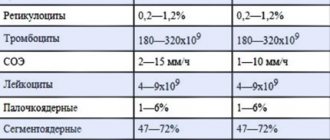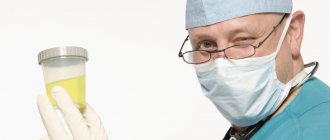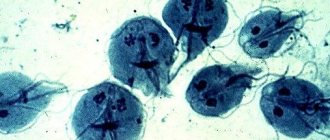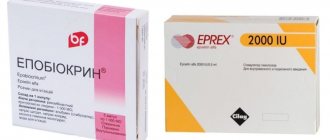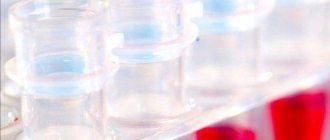Blood tests are the basis of all medical examinations.
Since many diseases, including urological ones, do not manifest themselves in any way at the initial stage (there are no symptoms), a PSA blood test can identify the incipient pathology. What it is?
The purpose of this laboratory test is to determine the amount of prostate-specific antigen in a man’s blood. Proper preparation for donating blood for PSA is the key to a reliable result.
Contraindications
After certain medical tests and procedures, prostate specific antigen testing is contraindicated. Among them:
- After a prostate biopsy, you can donate blood for PSA no earlier than 4-6 weeks later.
- Palpation of the prostate (not earlier than 2 weeks).
- Surgery on the gland using a laser (4-6 weeks).
- Ergometry.
- Cystoscopy (has a minor effect on the result, but it is recommended to abstain for 2 weeks).
- TRUS (not earlier than 2 weeks).
- Colonoscopy.
- After transurethral resection of the prostate (TURP), testing should be done no earlier than 6 months after surgery.
Who is prescribed a PSA test?↑
Determination of prostate-specific antigen content is indicated:
- If during the examination the doctor discovered an enlarged prostate.
- If there is a suspicion of an infectious-inflammatory process in the gland.
- During a comprehensive diagnosis of malignant tumors or prostate adenoma.
- When a man complains of painful symptoms characteristic of prostatitis: frequent painful urination, aching pain in the groin area radiating to the lower back.
- For men over fifty years of age for the prevention of prostate adenocarcinoma.
- If the patient’s relatives have been diagnosed with malignant neoplasms of the gland, he is recommended, starting from the age of forty, to take a blood test at least once a year to determine PSA levels.
- To evaluate the effectiveness of therapy for benign hyperplasia or malignant prostate tumor.
How to Prepare for a PSA Test
You should prepare for the analysis 15-20 days before it is carried out, because the results of the examination depend on many factors and may be distorted. Preparation for a prostate PSA test includes the following restrictions:
- In 2-3 weeks, stop using drugs to increase potency or testosterone.
- For 2 weeks, refuse any procedures affecting the organ (palpation, TRUS, massages).
- If there is a catheter in the bladder, it must be removed 2 weeks before the examination.
- Follow a dietary diet for 2 days before taking the test (avoid fried, spicy and smoked foods, stop drinking alcohol and coffee).
- Avoid sexual intercourse for 2-3 days before the examination.
- Avoid physical activity the day before donating blood (including cycling, exercise, horse riding).
- Quit smoking 1-2 days before the test, if impossible - at least 2 hours.
- Avoid stress for 1-2 days.
- Stop eating 12 hours before. Avoid drinking any drinks, limit your water intake (a small amount of pure non-carbonated water is allowed).
- Try to remain calm when donating blood (anxiety or irritability can affect the results).
Medications
Preparation for donating blood for PSA involves stopping the consumption of pharmaceuticals 9–12 days before the procedure. The following categories are prohibited:
What does creatinine show in the blood?
- Tablet contraceptives.
- Ascorbic acid as part of any vitamin complex.
- Biologically active additives.
- Hormones.
- Transdermal drugs designed to increase testosterone levels.
- Means to enhance erection.
If the medications used include vital ones, their further use should be agreed only with the attending physician.
How to donate blood for PSA
The analysis is taken from a vein; the required blood volume is from 5 to 10 ml. The examination can be carried out at any blood collection center. Often the procedure is prescribed for the first half of the day, although the daily fluctuation of the indicator depends little on this. When taking blood for testing, the patient is in a sitting position; if there is anxiety or dizziness, the collection can be carried out in a supine position.
If conflicting results are obtained, the procedure can be repeated after some time. The test results are subject to many factors, so PSA is not a universal diagnostic procedure.
What is PSA
Prostate specific antigen is a tumor marker whose level is determined in blood serum. An antigen is an organ-specific marker; it does not accurately indicate a specific prostate disease. According to its molecular structure, PSA is a polypeptide that includes a huge number of amino acids linked by bridges. It is synthesized by both normal and tumor cells. The marker is a protease from the chymotrypsin group, so it is necessary for sperm liquefaction.
Normally, a small amount of it is synthesized and enters the seminal fluid and prostate secretions, and an even smaller amount enters the blood. Other sources of its production: mammary gland, paraurethral glands, amniotic fluid. Total and free PSA are present in the blood. Free is referred to as free PSA. Bound forms are divided into 2 groups: PSA-AMG - a complex with antichymotrypsins and PSA-AXT - a complex with macroglobulins.
Interpretation of PSA results
The normal PSA level in the blood is 2.5-4 ng/ml. However, its concentration increases with age, so it is customary to differentiate the norm in accordance with the age indicator:
- up to 49 years - up to 2.5 ng/ml;
- 50 – 59 years – 2.5-3.5 ng/ml;
- 60 – 69 years – 3.5-4.5 ng/ml;
- after 70 years – 4.5-6.5 ng/ml.
Values up to 10 ng/ml are usually called the “gray zone”. In this case, making a decision about the need for a biopsy is difficult. Therefore, the ratio of free PSA to total is compared; normally it is 0.15. If the ratio is lower or if the value of prostate-specific antigen in the blood is above 10 ng/ml, a prostate biopsy is indicated.
With age, the prostate increases in size due to benign growth, therefore, for more accurate results, an indicator such as density is determined - the ratio of the PSA value to the volume of the gland. A value not exceeding 0.15 ng/ml/cm3 is considered normal.
During regular examination, the rate of change in PSA is considered valuable data; it should not exceed 0.75 ng/ml/year.
In addition to diagnosing oncological processes, the PSA level is used in treatment. To do this, its indicator is measured after various procedures. There should be a noticeable decrease in it, which will indicate the effectiveness of the treatment. An increase will indicate a relapse of the disease.
Physiological characteristics and diseases affecting changes in analysis results
Prostate cancer in the first stages is hidden and painless. More often , it is accidentally discovered during the diagnosis of concomitant diseases of the urinary system.
Factors that change the reliability of research results:
- Age of the man;
- Geographical place of residence of a person;
- Height above sea level;
- Climatic conditions of the area.
According to genetic studies, most men have a predisposition to an increase in the size of the prostate gland, which will be normal for the individual, but may fall within the critical average values of the antigen level. Racial characteristics also suggest fluctuations in dog blood values.
What can affect PSA levels?
Serum PSA values can be reduced by following certain rules in food selection.
Avoiding foods that increase PSA levels
Foods that irritate the prostate gland increase prostate-specific antigen levels.
Avoid foods that increase PSA levels
List of products whose regular consumption increases the level of prostate-specific agent in the blood serum:
- milk and dairy products (cheese, yogurt, eggs) contain large amounts of milk protein and saturated fats;
- animal fats contained in meat, butter, lard;
- meat, fish, potatoes and other products prepared by frying (contain carcinogens)
- canned foods.
Including foods that reduce PSA levels in your diet
Products containing lycopene
Lycopene is a natural red pigment. Contained in red, orange and yellow vegetables, giving them their characteristic color. Fruits and berries rich in lycopene - apricots, tropical guava, red grapefruit, watermelon. By chemical nature, it is an antioxidant - a substance that protects body cells from the harmful effects of free radicals. With age, the amount of antioxidants synthesized in the body decreases. Products containing natural antioxidants replenish the “reserve”, maintaining homeostasis and preventing the development of diseases.
Eating tomatoes can reduce PSA levels
A large amount of lycopene is found in tomatoes and their culinary products: tomato paste, sauce, juice. The beneficial properties of lycopene increase with thermal cooking of tomatoes. The content of beneficial pigment in tomato paste is even greater than in whole vegetables. The combination of lycopene with vegetable oil improves its absorption and digestion in the body. If there are contraindications to consuming tomatoes, you can replenish the content of the beneficial substance by taking the dietary supplement “Lycopene”.
"Lycopene"
Interesting ! Dihydrotestosterone is a hormone that promotes prostate growth. Products containing lycopene - lysine and zinc - block the production of dihydrotestosterone and reduce the risk of developing prostate cancer.
Products containing lysine
What distorts the results of the prostate-specific antigen test?
An abnormal level of PSA protein in the blood is not necessarily direct evidence of a tumor in the prostate. There are a number of factors under the influence of which a high jump in the indicator occurs.
These include:
- Take medications at least a few days before the procedure. Hormones and potency-enhancing medications especially affect the concentration of PSA protein;
- Ejaculation within 2 days before collection;
- Active sports activities, horse riding, cycling or training on an exercise bike;
- Installed catheter after surgery on the genitourinary system;
- Physical impact on the gland 7-10 days before the analysis, including massage;
- Past trauma.
Eliminating these factors is an effective way to reduce prostate PSA levels after the results have been determined to be false positive.
The average level of total antigen in the blood is 0-4 ng/ml normally. The concentration of this protein in the blood changes with age.
The norm of total prostate specific antigen PSA for men of different age categories varies as follows:
- Under 49 years old – up to 2.5 ng/ml;
- Up to 59 years – 2.5-3.5 ng/ml;
- Up to 69 years – 3.5-4.5 ng/ml;
- Over 70 years old – 4.5-6.5 ng/ml.
Under the influence of various factors, the indicator may shift slightly down or up. Exceeding the level of 10 ng/ml requires additional research, in particular the ratio of free protein to total level.
Filling in analysis results
If the test shows a total PSA level in the blood of more than 30 ng/ml, this is considered confirmation of prostate cancer.
Exceeding the norm of prostate specific antigen may be a sign of the following pathological changes in the prostate:
- Infectious and inflammatory process in the structure of the gland;
- Diseases of the genitourinary system in the acute phase;
- Benign formation in the gland cavity;
- Ischemia or infarction of the prostate;
- Malignant formation (prostate cancer).
To clarify the established diagnosis, additional tests are prescribed, primarily a biopsy.
In men over 40 years of age, the risk of developing prostate cancer increases sharply. Therefore, it is recommended to undergo comprehensive diagnostics with blood donation for PSA of the prostate several times a year, ideally once a quarter.
A prostate specific antigen (PSA) test is performed on men to detect a foreign, dangerous substance produced by the prostate gland. The analysis will also help identify pathological growth of the prostate (benign neoplasm) and inflammation (prostatitis). Preparing for a PSA blood test is certainly important, as it is fully responsible for the initial result of treatment. There are many nuances here that it is better for the patient to observe in order to accurately exclude or identify the antigen and conduct a correct study. There are also certain criteria for those who would benefit from a PSA test:
Our readers recommend
Our regular reader got rid of PROSTATITIS using an effective method. He tested it on himself - the result was 100% - complete relief from prostatitis. This is a natural remedy based on honey. We tested the method and decided to recommend it to you. The result is fast.
EFFECTIVE METHOD
.
- For men over 35 years of age, it would not hurt to take this test once a year for the benefit of their health.
- Mandatory examination of the patient prescribed by the attending doctor.
- Regular monitoring of patients being treated for oncology and monitoring the benefits of the medications used.
- Due to the possibility of prostate cancer.
The main purpose of prostate specific antigen is to dissolve clots of seminal fluid, liquefy it and flow through the urinary canal during erection. For further free movement of sperm through the vaginal canal of the uterus and rapid fertilization of the woman’s egg.
Detection of the level of antigen is considered the main thing in the analysis, since an increased amount of it has the ability to inflame the mobility of cancer cells, which are very dangerous for people; it is difficult to treat a tumor and no one guarantees a complete recovery. Antigen analysis also helps to identify many pathologies of the prostate gland.
Prostate
The unusual material antigen is produced by the prostate glands and consists entirely of protein. This element is part of the composition of the seed. Total and free PSA make it possible to identify a health problem early. A small part of the antigen has the ability to enter the blood and is there in an independent free form and in connection with a protein substance.
Total PSA is more common and less sensitive, which is why it is classified as an oncology (cancer) marker. But the painful process of prostate cancer can only be shown in the ratio of free and total antigen markers. Basically, when determining the antigen, a general PSA marker is taken, but if the result is high, an expanded type of analysis is performed, which has as many as three indicators of diseases at once. The specifics and preparation of PSA tests are identical and are performed from one blood sample.
Exceeding the analysis values is influenced not only by diseases, but also by a person’s physiology and personal criteria, for example, in a significant number of men there is a genetic factor, enlarged prostate glands, which is followed by the production of a large amount of antigen. The type of sport also affects, if a person engages in one; any sport associated with pelvic load contributes to an increase in PSA in the body. Its amount depends on the ethnic heritage, the race to which a person belongs; each race has its own antigen rate. There may also be more unpleasant reasons:
- prostatitis;
- prostate adenoma;
- prostate cancer.
In any of the options, the increased antigen will not be a decisive factor. It is best to remember that chronic inflammation and adenoma increase the chance of developing cancer.
The antigen is not always increased, but in some cases it is also decreased. Factors leading to a decrease in PSA levels: taking medications, to be precise, those used to treat adenoma. Excessive weight seriously affects the deviation of the antigen from the norm. And this can have serious consequences, so you definitely need to fight it with the help of properly selected diets (minimum fatty and sweet foods, more carbohydrates, proteins and vitamins). And of course, well-designed physical exercises (running, push-ups, pull-ups, and so on) are effective in the fight against excess weight.
An important condition for the correct completion of the PSA test, a couple of weeks before the test, you should not attend digital examinations of the prostate, biopsies, ultraviolet examinations, gland massage, laser therapies, cystoscopies.
Preparing for a PSA test is not a difficult task at all, and does not require any extra effort from a man. But there are still a decent number of medical requirements to undergo an antigen test. The basic rule for donating blood from a vein is changing your diet.
This is the best time to eat healthy, prepare delicious homemade food in which the desirable presence of the following ingredients:
- Chicken, beef, pork in small quantities.
- Your favorite fish, whatever you like, as long as it’s fresh, just not smoked and minimally salted.
- Cereals of various types, buckwheat, rice, pearl barley are mandatory consumption of these cereals.
- More fresh vegetables: carrots, cucumbers, cabbage, ginger.
- Fruit pomegranates, bananas, apples, oranges.
- Dairy products cottage cheese, yogurt, milk.
- Drinks: juices, fruit drinks, still water, green tea.
It is advisable to exclude the following types of food from your diet at least a couple of days before donating blood and say no:
- Most types of questionable food in public catering establishments are hot dogs, hamburgers and the like.
- Smoked, fried and various canned products.
- Spicy and salty foods are also not allowed.
- Drink less coffee, black tea and carbonated drinks.
The main thing, dear men, remember: PSA analysis is performed on an empty stomach, with an interval of at least 8 hours between the last meal and blood donation by the patient. If you suddenly need to identify triglycerides, the interval is increased by 4 hours. Another 8 hours before the test, you will have to stop taking fluids.
It must be said that preparing for a PSA test in men is a responsible and serious period, and in order to avoid unnecessary waste of nerves, time and money, it is better to prepare correctly.
It should be noted that in the preparation process a few days before donating blood from a vein, it is recommended to exclude all kinds of physical activity. It is very important not to load the pelvic area at all; you cannot engage in any type of equestrian sport, that is, sit in the saddle, ride a bicycle or exercise bike, even a motorcycle. Accordingly, heavy sports activities, all competitions, friendly matches and any active recreation are prohibited. Eliminate physical labor at home and at work. It is better to be in a relaxed state for a couple of days; another important aspect is to exclude intimate relationships and sex.
One of the most important factors in the satisfactory state of both the emotional and physical state of the human body. For a satisfactory psycho-emotional state, it is best to abstract yourself for a short period of a couple of days, from pressing problems and concerns, and devote this time to your own or family vacation. Engage in your favorite entertainment, hobby for a greater influx of positive emotions and thoughts. Throw out all possible results of the analysis from your head, stop stressing yourself out and inventing illnesses for yourself, since thoughts are material, it’s better to think about good things. After all, bad thoughts will not lead to anything good. In the modern world, 40% of males over the age of 31 are prone to prostatitis and have signs of the disease. All symptoms identified in time can be easily treated with current medicine. So there is no need to worry and be nervous about prostatitis, as this is fraught with consequences, increased blood pressure, unnecessary nervousness, headaches and insomnia. And such a state is unacceptable before analysis, since it directly affects the result.
This, like other tests, is taken in the morning until a maximum of 11-00. The first rule of admission is that the test is taken on an empty stomach; the patient cannot eat anything. Mandatory adherence to the following points: on the day of the PSA analysis, the patient is prohibited from drinking or eating for 8 hours before donating blood. A couple of hours before the test, you should not smoke and it is better to stop taking prescribed drugs and medications. Before taking blood, try to rest and relax, calm down, there should be no physical or psychological stress. If you feel unwell before blood sampling, which often happens due to abstinence from food, the person is placed on a couch and blood is drawn in a supine position.
For PSA analysis, blood is taken intravenously, which significantly increases the accuracy of the test result. The volume of the required amount of material is no more than 10 milligrams and no less than 5. If the result of the analysis raises doubts among you or the doctor, a repeat procedure is allowed. For a reliable and correct result, blood donation will be performed at the same time at which the first PSA test was performed.
Risk factors
Age
Age over 40–45 years is a good time to undergo a PSA test during your annual physical examination. For men under 40 years of age, it is advisable to carry out a PSA test when signs of prostatitis or symptoms of other prostate diseases appear:
- chronic pain in the groin and lumbar region;
- pain when walking “in a small way”;
- feeling of fullness even after emptying the bladder;
- frequent urination at night;
- difficulty urinating;
- passing urine in portions.
Men over 45 years of age are at higher risk of developing prostate cancer
Genetic predisposition
Age and heredity are established risk factors.
A history of cancer in close relatives increases the risk of developing a tumor. Their incidence of prostate cancer increases their likelihood of getting it at a younger age.
If a patient has a family history of cancer, they are at higher risk of developing cancer.
Overweight
Increased consumption of animal fats and a sedentary lifestyle are likely risk factors.
With a sedentary lifestyle, lack of sports and physical exercise, excess weight develops.
In obese men, PSA can change its values and lead to diagnostic errors.
A sedentary lifestyle and being overweight can contribute to the development of this disease.
Diet alone is not the cause of prostate cancer. However, regular consumption of foods high in fiber and a balanced amount of fat reduces the level of the male sex hormone - testosterone. This reduces the risk of malignant degeneration of prostate cells.
Urogenital infections
A potential risk factor is sexually transmitted infections (STIs). The chronic course of the disease and ineffective treatment can cause prostate cancer.
If a person is a carrier of an STI, the risk of developing prostate cancer is significantly higher.
The risk increases significantly when several unfavorable factors are combined.
Medical procedures
Various treatment methods and manipulations may affect the validity of the study. Before testing the patient's blood for prostate-specific antigen, you should wait some time after mechanical impact on the prostate. PSA is always contained in the blood; only the concentration of the antigen changes depending on the state of health.
After more complex procedures such as biopsy, transrectal ultrasound, transurethral resection, it may take several weeks to several months before a blood test is ordered. A referral for testing is given by a urologist; after receiving the results, a consultation with an oncologist is possible.
Indications for PSA testing in men
A PSA test in men is a laboratory test.
Using a blood test, prostate specific antigen (PSA) is determined.
According to its chemical structure, it is a protein compound.
Appears in the blood during an oncological process in the prostate gland.
Indications for PSA testing in men
Prostate specific antigen is detected in increased quantities during the development of the prostate tumor process.
Therefore, its detection is carried out for the purpose of diagnosing prostate cancer in the following situations:
- Suspicion of the development of prostate cancer after other research methods have been performed (digital examination of the prostate gland, visualization of the organ using ultrasound diagnostics).
- Monitoring the course of prostate cancer over time. As well as monitoring the effectiveness of its radical or conservative treatment.
- A preventive study for the purpose of early detection of a possible tumor process in the prostate gland in men over 40 years of age.
A PSA test is performed every 3-4 months during radiation therapy or chemotherapy for prostate cancer to monitor its progress.
How to take a PSA test in men?
For research in the manipulation room of a medical institution, blood is taken from the ulnar vein in a volume of 5-10 ml.
Then it is transported to a specialized laboratory, where the PSA concentration is determined.
Depending on the indications, total or free prostate specific antigen can be determined in the blood.
The analysis is carried out on the basis of a referral from a urologist.
Before taking it, it is important to follow the preparation recommendations
Preparing for a PSA test in men
To obtain reliable PSA test results, you should follow a number of preparation recommendations before donating blood, which include:
- During the week before the study, you should avoid sexual intercourse to reduce the functional load on the prostate gland.
- 8 hours before donating blood, you should limit your consumption of meat. Avoid fatty, fried foods, spices, marinades and alcohol.
- If a digital examination of the prostate gland is performed by a urologist, a PSA test should be taken before such an examination or 2 weeks after it.
An analysis for determining prostate specific antigen is carried out no earlier than 10-14 days after:
- prostate massage,
- cystoscopy (examination of the mucous membrane of the bladder using an optical cystoscope),
- catheterization (insertion of a probe) of the bladder in case of significant difficulty in urinating.
After a biopsy (taking a section of prostate tissue for histological examination under a microscope), a PSA test can be performed no earlier than 1 month later.
Interpretation of PSA test results
The normal concentration of prostate specific antigen in the blood is from 0 to 4 ng/ml.
In older men, this figure may normally be slightly higher.
An increase in PSA in the blood is the result of the development of a malignant neoplasm of the prostate gland.
A slight increase in PSA levels may occur with:
- chronic inflammation of the prostate gland,
- prostate adenoma,
- due to mechanical effects on the organ (massage, biopsy).
The interpretation of the results of the PSA blood test is carried out by a urologist, who determines further treatment and diagnostic tactics.
For any prostate disease or the need for a PSA test, contact the author of this article - a urologist, venereologist in Moscow with 15 years of experience.
PSA blood test and preparation for it
Indications for PSA analysis are:
- preventive examination, which reveals the dynamics of changes in the level of prostate specific antigen;
- suspicion of the development of a malignant process in the prostate gland;
- to determine the trend of therapeutic measures in the treatment of prostate diseases of various etiologies to adjust prescriptions;
- examination after treatment (surgery) for prostate cancer.
What does it mean to donate blood for a prostate agent?
The prostate gland synthesizes a protein substance - a prostate-specific agent, the function of which is to liquefy the seminal fluid. Any negative changes in the male genital organs - inflammatory or malignant processes, pathologies associated with hormonal changes - and the level of a specific prostatic agent in the blood formula changes.
Using this test, when donating blood, you can determine the quality of the disease - malignant or benign.
Reliable results can only be obtained with proper preparation for the analysis.





